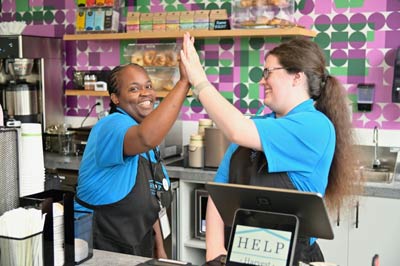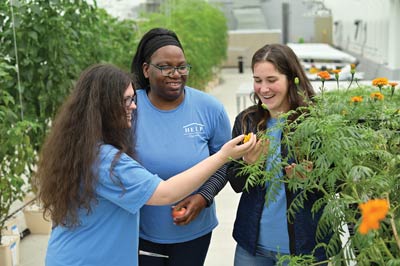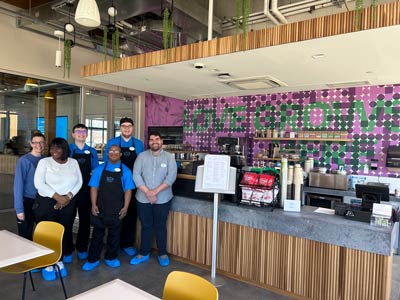The Evolution of Supporting People with Intellectual and Developmental Disabilities (IDD) Through Community Employment
Perhaps no other field has evolved so much and so rapidly as the field of IDD or Individuals with Intellectual and Developmental Disabilities.
Over the past decade there has been a system-wide shift from sheltered workshops to community employment. HELP has been a zealous advocate that individuals have the right to earn a fair and prevailing wage alongside individuals without disabilities in a fully integrated and community setting.
Since 1965 HELP has been on the leading edge of the IDD field as a trusted partner to hundreds of families, thousands of individuals with IDD and a culmination of community partnerships, most recently with the Cleveland Foundation and the opening of Susanna’s Café by HELP Harvest.
Where We’ve Been
In the early 1980s most people with IDD worked in sheltered workshops doing repetitive production work for piece-rate pay, which measures the rate of pay by how fast one works. This pay usually resulted in less than minimum wage, although some sheltered workshops paid minimum wage. According to the National Council on Disabilities, sheltered workshops are historically ineffective at transitioning people with disabilities to integrated employment. On a basic level, sheltered workshops left many people with IDD feeling disengaged, devalued and unwelcome in community settings.
The 1990s brought a slight shift to community employment for people with IDD with vocational training which offered a less restrictive environment but still very isolated, structured and control working conditions. While it was an improvement from the sheltered workshop years, it still did not adequately move people on a path to integrated community employment.
Part of that was due to a lack of funding for programs to offer long-term support and infrastructure. Another part was due to the antiquated belief that people with IDD were not capable of thriving in community employment. Without proper infrastructure, social awareness and societal belief, individuals with IDD kept failing at their attempts to work in the community.
Where We’re Going
 For 58 years, HELP has been on the forefront of bringing positive change and eliciting community support in helping people with IDD integrate in the community in a larger and more fulfilling way. That innovation is echoed in our most recent partnership with the opening of Susanna’s Café by HELP Harvest at the new Cleveland Foundation headquarters in MidTown.
For 58 years, HELP has been on the forefront of bringing positive change and eliciting community support in helping people with IDD integrate in the community in a larger and more fulfilling way. That innovation is echoed in our most recent partnership with the opening of Susanna’s Café by HELP Harvest at the new Cleveland Foundation headquarters in MidTown.
The concept behind the new Susanna’s Café by HELP Harvest leverages the core concepts of Ohio Department of Developmental Disabilities (DODD) BEST (Basic Employment Skills Training) model to enhance and expand our programming.
This enhanced training model focuses on life skills such as teamwork, problem solving, time management, work ethic and interpersonal skills that are critical to navigating employment. This new and time-limited curriculum serves as a stepping-stone to competitive and integrated employment – also known as community employment – which will transform the way traditional vocational habilitation are currently designed and funded.
What the HELP Harvest Curriculum Looks Like
 HELP Harvest incorporates three innovative curriculum-based vocational training programs that enhance our services for individuals on their paths toward community employment. It all starts in the HELP Harvest Greenhouse where individuals with IDD train in a group-setting with limited work hours – about 20 a week with up 50% of that being paid. Individuals work alongside a professional horticulturist and learn how to seed, plant, grow and harvest hydroponically grown produce – typically lettuce, tomatoes and peppers and microgreens.
HELP Harvest incorporates three innovative curriculum-based vocational training programs that enhance our services for individuals on their paths toward community employment. It all starts in the HELP Harvest Greenhouse where individuals with IDD train in a group-setting with limited work hours – about 20 a week with up 50% of that being paid. Individuals work alongside a professional horticulturist and learn how to seed, plant, grow and harvest hydroponically grown produce – typically lettuce, tomatoes and peppers and microgreens.
The remaining part of their week is spent in the classroom learning workplace skills that are vital to forming relationships with co-workers, building trust, and enjoying social interactions and comradery that we all share in our work environments.
Produce grown at HELP Harvest Greenhouse is then used to create healthy meals and snacks at the HELP Harvest Kitchen, which is the subsequent program of the HELP Harvest curriculum. There individuals learn to prepare and portion ingredients, shop, cook, pack, and label finished products.
 The final part of the HELP Harvest curriculum is for individuals eager to learn “front of house” operations in Susanna’s Café. This stepping-stone provides a seamless transition from training to moving into community employment but with support from HELP Staff.
The final part of the HELP Harvest curriculum is for individuals eager to learn “front of house” operations in Susanna’s Café. This stepping-stone provides a seamless transition from training to moving into community employment but with support from HELP Staff.
For nearly six decades, HELP has been on the forefront of moving the needle in how people with intellectual and developmental disabilities are cared for, advocated for, and supported in the community. We have aligned our organization with partners that were willing to be in the trenches with us and our mission, working hard to charter a path for a more fulfilling life for people of all abilities.
The Cleveland Foundation’s partnership with HELP to make Susanna’s Café by HELP Harvest come alive is a testament to the work of many in the IDD field through the years. We are grateful beyond measure to the Cleveland Foundation for their trust and vote of confidence in our mission.
